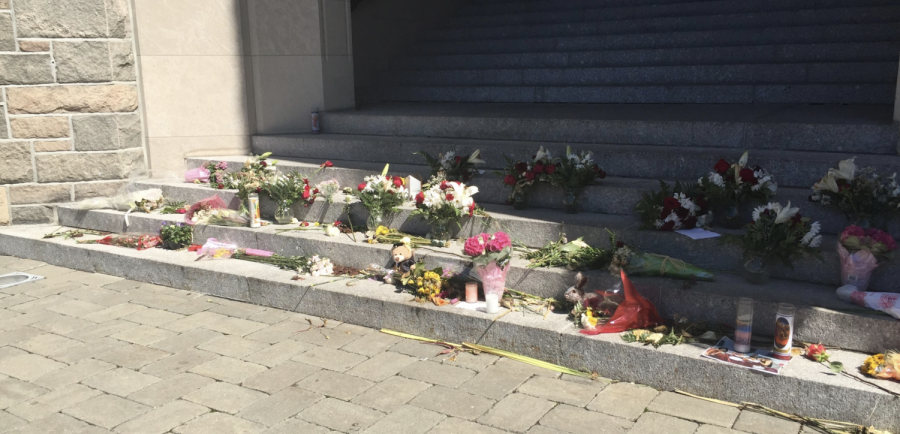Reflections on Sydney Monfries’ Passing
A special report from the Fordham Observer News Desk
GABE SAMANDI/THE OBSERVER
Photos, candles and flowers line the steps of Keating Hall, the building where the accident occurred, to honor the life of Sydney Monfries.
May 1, 2019
During the month of April, Fordham University became the center of a national media storm surrounding the passing of Sydney Monfries, Fordham College at Rose Hill (FCRH) ’19. In the eyes of most students close to her, Monfries was the victim of a series of tragic events. Her death, which was in most regards a freak accident, became the target of intense scrutiny nationwide drawing criticism and commentary from the furthest reaches of the country.
Students from New Jersey to California reported that they were approached by family and friends alike over Easter break in regards to Monfries’ passing. They report being met with every reaction from concern to admonishment, as misperception of the events and a national search to place blame quickly overshadowed the impact of Monfries’ loss to the Fordham community.
Coverage by national outlets such as The Daily Mail and The New York Post was regarded by many students as sensational and inappropriate, drawing harsh criticism in a staff editorial by Rose Hill’s student newspaper, The Fordham Ram. Yet that coverage was precisely what guided the national conversation that enabled people — even those completely removed from the Fordham community — to assign blame.
Voices from across the country saw the event as a reason to implicate the Fordham community of wrongdoing. Between the perception that it was the University’s neglect or the accusation that Monfries herself was to blame, there was no shortage of opinion thrown at the Fordham name.
And then, almost as suddenly as it started, the national conversation around Monfries gave way to the next sensational headline. After passing judgment on the way she died, few took time to reflect on the life that she lead.
To students at Fordham, the painful aftermath of these events is still apparent. At Rose Hill in particular, there has been a very different tone of the conversation surrounding the life and legacy of Monfries.
Monfries passed away just weeks before graduation. The University confirmed that they will posthumously present Monfries a bachelor’s degree in May. She majored in Journalism and had interned as a Photo Editor at InStyle magazine during her time at the University.
In a joint statement released by United Student Government, Commuting Students Association, Residence Halls Association and Campus Activities Board, they stated that “she loved, and was loved by, the hundreds of lives that she touched throughout her four years at Fordham.”
Instead of sensationalizing her death, as much of the country did, the Fordham community sought to remember and honor the life of Sydney Monfries.
The Sunday of Monfries’ passing, scheduled Palm Sunday services at the Rose Hill University Church were extended to comfort the Rose Hill community. Students filled every pew, lining each wall and standing in crowds filing out of the entryways as mourners gathered together. The service was somber, as the congregation, choir members and clerics alike fought back tears.
On Tuesday, April 16, a memorial service honoring Monfries was held at the same University Church, which was covered closely by The Fordham Ram. The chapel was again completely filled, with countless members of the Rose Hill community gathering to celebrate Monfries’ life. Many close friends of Monfries shared stories and expressed gratitude for having known her.
The nature of Monfries’ untimely and tragic death shook nearly every student at Fordham — shortly after Monfries’ passing, Rose Hill students were hesitant to spend time on Eddie’s Lawn, the popular public space in front of Keating Hall, despite the much-awaited warmer temperatures. Crowded elevators in the Leon Lowenstein building became discussion halls about how Monfries had passed. Students from both campuses report that in the week following the event, they could not go more than a few hours without overhearing a conversation about her.
A story that drew eyes from around the country took place on Fordham’s campus, and directly affected Fordham’s students.
While students from both campuses were affected by the news, there was admittedly a difference in the way that the event and ensuing coverage impacted each campus.
As one Lincoln Center student put it, “the tone at Lincoln Center was a lot less serious. It was definitely in the back of everyone’s mind,” they said, “but if this had happened at Lincoln Center, people would’ve been a lot more affected.”
The Observer, as the student voice of Fordham Lincoln Center, respects that the Rose Hill campus dealt with Monfries’ passing in a much more personal way.
Further, it is understood that in the immediate aftermath of the event, The Observer’s coverage was one of many remote voices that potentially contributed to the sensationalization of Monfries’ passing. Artificial divides between the two communities had in some ways detached the students of Lincoln Center from the gravity of what had occurred on the Rose Hill campus.
In the aftermath of such distressing events, one point remains abundantly clear: the loss of a Fordham community member is a loss for all of us.
This academic year also saw the untimely and tragic loss of three other Fordham students: Donika Celaj, FCRH ’18, Nicholas Booker, FCRH ’22 and Rachel Ragone, Gabelli School of Business at Rose Hill ’16. Summer break saw the loss of university provost Stephan M. Freedman. Over Winter break, Fordham Law lost professor Kimberly Greer. Just last week on April 26, Francis Simon, a dining services employee at Rose Hill, passed.
Each circumstance confronted the Fordham community with a different loss, but the absence of these individuals has not gone unnoticed. Each of these deaths were of themselves a tragedy, but the life and legacy of every one of these Fordham community members is worth remembering.
If Monfries’ passing has shown the Fordham community anything, it is that death is not to be sensationalized. Rather, life is to be celebrated.














Gwen • May 8, 2019 at 9:15 pm
Could you have not used the word passing? She died.
Katie Doman • May 1, 2019 at 2:03 pm
Not to critique an otherwise great article, but we also lost Will Jones, LAW ’20, this winter. He was a dedicated public interest student and I miss seeing his friendly face and green hat around the halls.
Nicholas Costantino • May 1, 2019 at 1:58 pm
5-1-2019
The Life of Sydney Monfries – by Nick Costantino
I did not know Sydney Monfries, but her tragic death upset me anyway. Her untimely and sudden passing has also devastated her family and friends who were both shocked and heartbroken when they heard the news that Syd had died. A heartbreaking end for such a beautiful young woman who was loved, respected and admired by everyone who knew her. Sydney was kind, caring, compassionate, empathetic, creative, loyal, devoted, curious, intelligent, and was blessed with an uncompromising faith and an unconditional love for her family, friends, neighbors, and strangers, as well as those in need.
Someone once asked me if I believed that unconditional love exists and whether or not I had actually experienced unconditional love. I thought for a moment, and then replied that unconditional love is very rare, but it does exist. They were a bit perplexed at my answer and wanted me to provide evidence to support my claim. I replied: Jesus Christ was crucified, suffered, and died on a cross for our sins, and his sacrifice is an example of unconditional love that I carry in my heart and that I think about every day. My friend said ok, I can accept that example; but, what about unconditional love in our modern society? Can you think of any contemporary examples of unconditional love?
As I was considering my friends request concerning unconditional love, something profound occurred that caught my attention. On April 14, 2019 as I was browsing the internet, I caught glimpse of a tragic story about a 22 year old college student named Sydney Monfries, who suffered severe head trauma after falling from the Keating Clock tower at Fordham University. My first question was: “how could something like this happen?” My second question was: “what if this same tragedy happened to my daughter? What would I do? How would I react?”
As I was reading about this tragedy, it occurred to me that this was an accident and that the truth was that nobody was to blame and yet, all of the “so called” journalists seemed to be more interested in placing blame and finding fault without any consideration or interest in the victim, the victim’s family, friends or the students, faculty and employees of Fordham University. What about their feelings, needs and emotions? The news outlets were more interested in sensationalism and generating revenue, than they were in the human tragedy and the pain and suffering of all those affected by Sydney’s death.
By all accounts, written, verbal and as seen in Facebook and Instagram photographs, Sydney Monfries loved her family and friends. She was goal oriented and loved living life to the fullest, while also experiencing and celebrating each and every moment. Her best friend was her mother Susan, who loved to spend time with Sydney going on vacations, shopping and just being together. Sydney’s sister Caitlyn, respected, admired and saw Syd as her mentor and role model. Syd and Caitlyn did a wonderful photoshoot in 2015 that clearly shows the love and devotion that the two shared. And what can you say about the man who held it all together? Mr. Wayne Monfries… who supported Sydney in all of her endeavors and was her great protector, father and friend.
The Monfries are a loving family who practice their Christian faith, not just with words, but with deeds. Mr. and Mrs. Monfries ensured that both of their children (Sydney and Caitlyn) received a stable home environment, great education (Jesuit High School, Fordham University), loving parents and family, social activities i.e. vacations (Rome, London, Greece, etc), sailing, golf, football/baseball games (Giants/Yankees), cheerleading (Caitlyn), Lacrosse (Syd), visiting family, friends, and attending Church. This is a great American family who exemplify the meaning of “unconditional love.”
When I met up with my friend he asked me if I had found another example of unconditional love. I responded: “yes I have.” Well….are you going to tell me or leave me in suspense? I smiled at this and thought that maybe I should behave like a contemporary journalist and leave the reader in suspense, right? No…I can’t do that.
So I said: “Syd.”
Syd what?
Sydney Monfries is my second example of unconditional love, because she lived her Christian faith.
Romans 12:10
“Be devoted to one another in love. Honor one another above yourselves.”
Dear Sydney, we all have a purpose in life and I do believe that your purpose was to bring the light of love, hope and kindness into the hearts of every soul that you met. Our world is a better place because you existed and still exist in the hearts and minds of the family, friends and strangers whose hearts you touched. May God love you and protect you for all eternity and may we all learn, by your example: to Cherish Each Day. R.I.P. Sydney. 4-19-2019 – ncostantino
“Cherish Each Day” by Carol Guajardo
There are many things we take for granted in life, but we should never take life itself for granted. Every minute of every day is a gift, and we should be thankful for all the things we have been blessed with so far. Don’t let your problems and struggles weigh you down and get in the way of enjoying your day. Problems will always arise, and some will appear insurmountable. But if you stop and think about it, they are not as important as life itself. We need to focus on the gift of today and try to make it our best. We should cherish the time that we spend with our family and friends. Also, make it a point to do at least one act of kindness per day for anyone. When we lose someone we Love, we often think about all the things we should have said or done while they were still with us. So make it a point to show your loved ones just how much you Love, appreciate and are thankful that they are a part of your life. We should live each day as if it were our last doing the things we love and spending time with those we Love. Forgive often, enjoy the little things, and place your problems on the back burner. Cherish each day and try to make that day meaningful in some way, because in a “heartbeat” it can be taken away.
– Nick Costantino